Gary Neal Hansen's Blog, page 10
September 2, 2022
A Children’s Sermon on Luke 14:25-33
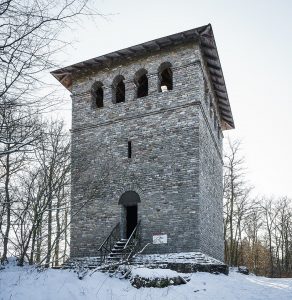
 CC BY Neptuul-SA 4.0
CC BY Neptuul-SA 4.0My, how nice it is to be back with you, writing a children’s sermon on Luke 14:25-33! I’ve been away for a few months due to a short-term pastoral assignment and a family move. Now we’re settled (sort of) and I’m back in action.
If you had come to depend on my children’s sermons, please accept my apologies.
And if you are new here, welcome! My practice is to send out a children’s sermon, almost always in storytelling form, on the Gospel text assigned in the Revised Common Lectionary for the upcoming Sunday. This week that’s Luke 14:25-33.
(You can find my regular Monday Meditation on this text here.)
Choosing My focusTo preach a children’s sermon on Luke 14:25-33 the first step is to decide which part to focus on. A children’s sermon needs to be pretty short, and it needs to focus on making one point.
This passage includes a bit of declarative teaching plus a couple little parables, so most of it has to be left out. It isn’t that I’m against those other parts. They’ll just be dealt with on some other occasion.
I’m going to leave behind the opening declarations. What Jesus says is very eye-catching, but little kids are pretty literal-minded. Helping them see the nuances of “hate your mother and father” would take way too much time.
That leaves me with the two semi-parables, both again on the cost of discipleship.
I say “semi” because they don’t follow the usual pattern of telling a story (“A sower went out to sow…”) or the alternate style of an extended object metaphor (“The kingdom of heaven is like a mustard seed…”). Instead, in these, the stories are implied in negative case studies: “Which of you… Or what king…”
To do this in storytelling form I’ll need to slightly re-imagine the teaching, recasting it so that it really is a story. And we’ll still have to make the metaphorical comparison work for kids. Hmm… Let’s see how it goes.
A Children’s Sermon on Luke 14:25-33Good morning, kids! I’m so glad you are here in worship this morning. Thanks for coming up to hear the children’s sermon.
One day, Jesus was talking to a crowd of people. He taught for a long time. Then, when everybody was heading home, he noticed one man standing nearby, looking kind of nervous.
“Thanks for coming,” Jesus said. “Did you want to talk about something?”
“I heard you talking last week at the synagogue,” he said. “So I came today to hear more. And, well, um — I’ve decided I want to be one of your disciples.”
“Are you sure?” asked Jesus.
“What do you mean, ‘Am I sure?’” asked the man. “I thought you’d just say ‘Hey, thanks, welcome aboard!’”
Jesus said, “Well, yes, I’m glad you want to be my disciple. That’s great. But deciding to my disciple is kind of a big deal. I want to make sure you’re really ready.”
“Ready for what? I figured I’d just come listen to you when you come to our village.”
“Well,” said Jesus, “a lot of times when I invite people to be my disciples I say ‘Follow me!’ Then they leave whatever they are doing, and we go around together, helping people and teaching about the kingdom of God.”
The man looked kind of shocked. “What? Like full time?” he asked. “You mean they leave their families and their jobs and stuff?”
“Well yeah,” Jesus said, “that’s how it’s worked so far.”
“Oh,” said the man. “I guess I could give that a try — for a week or so.”
“Actually,” Jesus said, “being my disciple is more of a forever thing. If you start, you have to stick with it for the rest of your life.”
“Oh, wow,” he said. “I don’t know…”
“Maybe you should talk to some of my other disciples,” Jesus said. “There’s Peter and John, and over there are Mary and Martha.”
“Oh, I don’t know, Jesus. I’m kind of nervous talking to strangers. Could you maybe just tell me a bit more yourself?”
“Sure,” said Jesus. “But if you are going to be my disciple I’m going to ask you to do other things too. Some of them might feel a little scary, at least the first time — even scarier than talking to my other disciples.”
“Hmm…” said the man. “That doesn’t sound so good. I’m not sure…”
“Well,” said Jesus, “I always say you should count the cost. Let me tell you a story.”
Building a TowerOnce upon a time, there was there was this man named Micah who had a house in the middle of town. He had neighbors on every side.
One day he thought to himself, ‘I know! I’ll build a big tower in my front yard. Then I’ll have a great view.’
So right away, he set to work. He dug a great big hole, way down deep in his front yard, for the foundation. Then he took big stones and started laying them in a thick layer, putting cement between each stone.
Looking for StonesBut pretty soon, he ran out of stones. So he went to one of his neighbor’s house and knocked on the door.
‘Hey Judith!’ he said. ‘Do you have any stones?’ He held his hands out to show how big the stones needed to be. ‘You know, about yay big?’
‘Hi Micah,’ Judith said. ‘Stones you say? Well we have one or two that big in our garden. I guess you can have them. What do you need stones for?’
‘Oh, Judith,’ Micah said, ‘I’m building this big huge tower in my front yard.’
‘A tower?’ Judith asked. ‘What do you need a tower for?’
‘It’s gonna be so great!’ he said. ‘I’m going to sit up there and have my coffee in the morning. I’m gonna look out and see the lakes and watch the boats sailing around. Or I’ll look the other way at the hills and watch the seasons change. It’s gonna be amazing!’
Well, Micah got those two stones from Judith, and he put them in place in the foundation.
Then he went to his other neighbors, one by one. Some offered a stone or two. Some didn’t have any. But Micah put them all in place in the foundation.
Progress ReportThen that evening, all his neighbors came out to see how the tower was coming along.
‘Not quite a tower yet, is it?’ asked one neighbor.
‘Looks more like a swimming pool with a stone bottom,’ joked another. ‘When you going to build the tall part?’
Micah said, ‘I don’t actually know. I kind of ran out of stones.’
Judith said, ‘I think you better go down to the quarry and buy some more.’
‘Buy stones?’ said Micah. ‘I can’t afford to buy stones. I thought…’
‘You better at least try,’ said Judith. ‘You must have some money saved up — I mean, a big building project like this costs a lot. How much money do you have?’
‘Well,’ said Micah, ‘We did save up a bit this year. But most of it is for food for this winter. And the rest is to send the kids to school. I guess I didn’t plan very well.’
Everybody was quiet for a bit. Then they all headed home.
Micah never did build his tower. But sometimes he would overhear his neighbors laughing about how he had that crazy hole lined with stones in his front yard.
Counting the Cost“Jesus,” asked the man, “why did you tell that story?”
“To show how it’s important to think ahead before you take on a big project.”
“But I don’t want to build some crazy tower,” said the man. “I want to be your disciple.”
Jesus looked at the man with his big brown eyes all full of love, and said, “Being my disciple is an even bigger project than building a tower. Are you ready to make that choice?”
“I don’t know…” said the man. “It kind of sounds like you don’t want me to be your disciple.”
“Oh, I do,” said Jesus. “But I want you to know what it really takes — because I want you to be my disciple forever.”
WonderingI wonder whether that man decided to become one of Jesus’ disciples?I wonder what Jesus might ask of me or you if we decide to be his disciples?I wonder how we might think about what it really will cost us to follow Jesus, and live his way, forever?++++++++++++
You are, of course, free to use this children’s sermon, or adapt it as you find most useful. But, if you use it, please do one (or more!) of the following.
You can let me know that you are using it, either in the comments below, or using the contact form above. You can put a little notice in your church bulletin that your children’s sermon is adapted from one published on GaryNealHansen.com.You can support my work over on Patreon. (Just $1 per month brings my children’s sermons straight to your inbox about two minutes after they go live. And every little bit keeps me going…)The post A Children’s Sermon on Luke 14:25-33 appeared first on Gary Neal Hansen.
May 12, 2022
On “Breathing In Christ” Podcast

 Deacon Marsha Roscoe of the “Breathing In Christ” podcast
Deacon Marsha Roscoe of the “Breathing In Christ” podcastI have not been posting regularly in the last month or so. It’s been a very busy time with preparing for a move at the same time as taking on a part-time pastoral post. But while my writing has had to pause (briefly!) a future project has been percolating in the background. The first fruit of that is a guest spot on the “Breathing In Christ” podcast
I’m going to be working with some wonderful folks in the Lower Susquehanna Synod of the Evangelical Lutheran Church of America on a spiritual formation project that will continue for the next year or so. They call it “soul care,” which I think is lovely.
Through this link You can find out all about the very cool ministry of one of the organizers, Deacon Marsha Roscoe, which includes the podcast.
Mostly she wanted her peeps to get to know me, so we range over a number aspects of my background, spiritual interests, and writing projects.
If you are relatively new here (like, if you aren’t a former student of mine) you might find this a more personal introduction than I’m able to give through blog posts. If you’re wondering who that guy is behind all those children’s sermons, here’s your chance.
You can listen to it right here, or you can find it in all the usual podcast places.
Gary Neal Hansen on Marsha Roscoe’s “Breathing In Christ” podcastEnjoy! I’d love to hear your response to any part of this, whether below in blog comments or by email through the contact form above.
++++++++++++It would totally make my day if I could send you all my new articles and announcements. Scroll down to the black box with the orange button to subscribe, and they’ll arrive by email most Fridays.
The post On “Breathing In Christ” Podcast appeared first on Gary Neal Hansen.
April 9, 2022
A Children’s Sermon on John 12:1-8 — The Anointing at Bethany
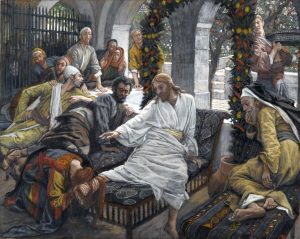
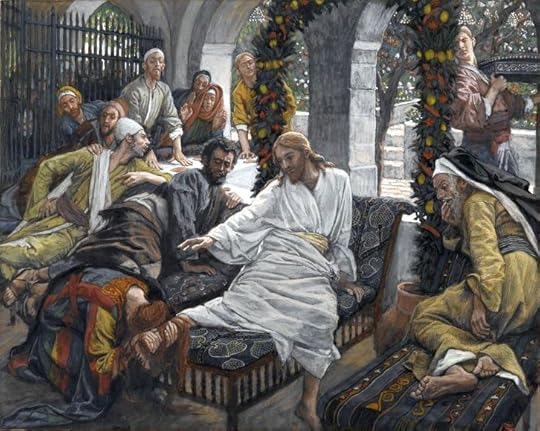 The Ointment of the Magdalene, James Tissot, 1900 (public domain)
The Ointment of the Magdalene, James Tissot, 1900 (public domain)Here’s my children’s sermon on John 12:1-8, “The Anointing at Bethany.” I wrote it for the fifth Sunday on Lent, but it might work quite well as a Thanksgiving children’s sermon. (You can find my regular Monday Meditation on the same text here.)
The Lectionary is mostly in Luke for Year C, but for the last Sunday before Holy Week begins it jumps here to John. In terms of John’s chronology that’s nearly right. He tells us it was six days before Passover, so really it was very close to Holy Week.
Anyway, John’s telling of the Anointing at Bethany is very interesting for its connections to other passages of Scripture.
The story of anointing is recounted in all four Gospels.But John sets it as the aftermath of the raising of Lazarus. And only in John, the woman who anoints Jesus is Mary, Lazarus’ sister. This changes the apparent motivation: instead of gratitude for sins forgiven, this is gratitude for a brother’s life restored. Additionally, John’s telling subtly echoes Luke’s famous story of Martha serving while Mary sat and listened to Jesus.As well as all that, John turns the focus strongly onto Judas, setting him up with a pretty rotten character. Judas, here, is a friend trusted with the group’s money, but who is actually an embezzler. He then covered his greed by hypocritically acting like he cared about the poor. It all seems to set us up to believe that Judas really would betray his Lord for cash.
But how much of this stuff is good for a children’s sermon on John 12:1-8? Probably not the embezzling and hypocrisy. Kids don’t need encouragement to be judgy.
++++++++++++You are, of course, free to use this children’s sermon, or adapt it as you find most useful. But, if you use it, please do one (or more!) of the following.
You can let me know that you are using it, either in the comments below, or using the contact form above. You can put a little notice in your church bulletin that your children’s sermon is adapted from one published on GaryNealHansen.com.You can support my work over on Patreon. (Just $1 per month brings my children’s sermons straight to your inbox about two minutes after they go live. And every little bit keeps me going…)A Children’s Sermon on John 12:1-8Good morning kids! I’m so glad to see you. I think it is just wonderful that you are here in worship today. Thanks for coming up to hear the children’s sermon.
Today is the fifth Sunday of Lent. In Lent, we spend 40 days, plus six Sundays, getting ready for Easter. Jesus died on the cross on Good Friday, but on Easter Sunday he was alive again. When Jesus rose up alive again, he gave us the greatest gift ever. He gave us new life, real life, forever life with God.
On each Sunday of Lent, our Gospel reading gives us something to help us get ready for Easter.
A Party Says “Thank You”Jesus had friends who lived in the village of Bethany. They were two sisters and a brother: Martha, Mary and Lazarus.
Not long before today’s story, Lazarus had died — but Jesus came and brought him back to life. In today’s story, Martha, Mary, and Lazarus are so grateful that they held a big dinner party for Jesus and his friends.
“Wow!” said Jesus when he came into the house, “It’s so nice of you to have us all over for dinner!”
“Well it’s the least I can do,” said Martha. “I mean, you saved my brother’s life! I’m just so grateful to you.”
“Martha,” said Lazarus, “he didn’t just save my life. He brought me back after I’d been dead for three days!”
“I know!” said Martha. “It’s still so amazing I can hardly think of words to say. So I’m cooking for you. That’s my way of saying ‘thank you.’ And of saying ‘I love you.’”
“Aww,” said Jesus, “that’s just great. You are totally welcome. And the dinner smells amazing!”
“Well come on in,” Martha said. “Sit down and I’ll bring the food. Where’s Mary? She’s supposed to help.”
Being Close Says “Thank You.”“Well I’m going to sit down with you,” said Lazarus.
“Aren’t you going to help me serve?” asked Martha. “How come you never help serve?”
“Oh Martha,” said Lazarus, “I’m so thankful for what Jesus did that I want to stay really close to him. That’s my way of saying ‘thank you.’”
“You’re welcome,” said Jesus. “I’m so glad you are alright. I was really sad when you died.
“Okay, fine,” said Martha. “But I think the best way to say ‘thank you’ is to serve someone a really special meal.”
A Present Says “Thank You”Just then, Mary came in with a beautiful white jar in her hand. It was made of alabaster, and seemed to almost glow with warm light.
Jesus and his friends were on the floor around a low table, leaning on cushions, enjoying the first part of the feast.
Mary came over to Jesus, where his feet were sticking out.
She knelt down. She opened the jar. Gently, gently she picked up one of Jesus’ feet, and poured something out of the jar on it.Then she did the same with his other foot. And then she took her long brown hair and wiped his feet with it.The room was filled with the smell of perfume — because that’s what she had poured out.
But just as soon as you could smell the perfume, you could hear an angry voice. It was Judas.
“What a waste!” he said. “That perfume could have been sold for a lot of money! Why didn’t you do that so we could give it to the poor?”
“Hey, it’s my perfume!” said Mary. “I get to use it for whatever I want. And this is my way of saying ‘thank you’ to Jesus.”
“You are welcome Mary,” said Jesus. “That was a beautiful, generous gift. Thank you. And Martha, thank you for this wonderful meal. And thank you, Lazarus, for sitting here and talking with me tonight. Those are all wonderful ways of saying ‘thank you.’
“I still think it was a waste,” grumbled Judas.
“Oh Judas,” said Jesus sadly. “You can show your thankfulness by caring for the poor some day soon. But Mary’s gift helps me feel ready for the hard things that are about to happen in Jerusalem.”
WonderingI wonder how Mary’s gift of perfume helped Jesus feel ready for what would happen on Holy Week?I wonder if there are things you would like to thank Jesus for?I wonder what you might do to say ‘thank you’ to Jesus? ++++++++++++It would totally make my day if I could send you all my new articles and announcements. Scroll down to the black box with the orange button to subscribe, and they’ll arrive by email most Fridays.
The post A Children’s Sermon on John 12:1-8 — The Anointing at Bethany appeared first on Gary Neal Hansen.
April 8, 2022
Blessed Are the Peacemakers — A Sermon
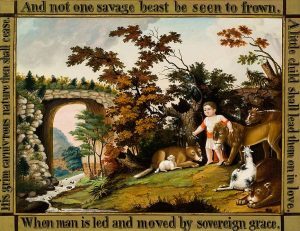
 Peaceable Kingdom of the Branch, Edward Hicks (public domain)
Peaceable Kingdom of the Branch, Edward Hicks (public domain)This week I preached on one of the Beatitudes: Blessed are the Peacemakers. I thought I’d share it with you.
If you’ve come here looking for my children’s sermons these last two weeks, I’m sorry to say they were not to be found. It’s a very complicated season in my life, one of the larger reasons being that I’ve started a half-time pastoral position. None of the previous responsibilities actually disappeared, so some weeks a thing or two doesn’t get done.
So, without further ado, I hope you’ll check out this video of our Wednesday evening Lenten Vespers service at Shadyside Presbyterian Church in Pittsburgh.
There’s a lovely cello trio playing the prelude (at 2:25), as well as other parts of the service. So you may want to enjoy the whole thing.
But if you want to hear just the sermon, I stumble up to the pulpit at 24:59.
Blessed Are the PeacemakersIt would totally make my day if I could send you all my new articles and announcements. Scroll down to the black box with the orange button to subscribe, and they’ll arrive by email most Fridays.
The post Blessed Are the Peacemakers — A Sermon appeared first on Gary Neal Hansen.
March 25, 2022
A Children’s Sermon on Luke 15:11-31 — The Prodigal Son

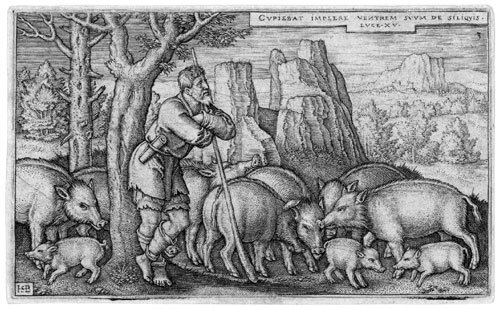 Prodigal Son as a Swineherd, Hans Sebald Beham, 1538 (public domain)
Prodigal Son as a Swineherd, Hans Sebald Beham, 1538 (public domain)For the 4th Sunday in Lent I bring you a children’s sermon on Luke 15:11-31. (You can find my regular “Monday Meditation” on this text here.)
The lectionary reading is actually Luke 15:1-3, 11b-31, but I’m skipping the first three verses. They place the story in a larger scene, but I want to focus just on the parable. So really it’s a children’s sermon or Luke 15:11-31, “the prodigal son.”
It’s one of Jesus’ longer and more complex parables. Really it is three separate stories told together:
The parable of the prodigal son It’s also the parable of the loving father And it’s the parable of the (grumpy) faithful son.A children’s sermon needs to be short and simple. (I know, that’s a standard mine often miss!) At best it should make one clean, clear point from the text at hand. I won’t try to tell the stories of all three characters. Maybe I can come back and tell the kids the other two stories another time.
As I wrote this it became overly long. The request of the younger son is so audacious that I kind of took a long time to set it up in a way that would be believable. What you see here is the short version after editing.
++++++++++++You are, of course, free to use this children’s sermon, or adapt it as you find most useful. But, if you use it, please do one (or more!) of the following.
You can let me know that you are using it, either in the comments below, or using the contact form above. You can put a little notice in your church bulletin that your children’s sermon is adapted from one published on GaryNealHansen.com.You can support my work over on Patreon. (Just $1 per month brings my children’s sermons straight to your inbox about two minutes after they go live. And every little bit keeps me going…)So here goes: a children’s sermon on Luke 15:11-31. I’ll tell one story, about one kid—the younger one, who made some very bad choices.
A Children’s Sermon on Luke 13:11-31Good morning kids! I am so glad to see you this morning. It’s really great that you are here in worship today. Thanks for coming up to hear the children’s sermon.
Today is the 4th Sunday of Lent. In Lent we spend 40 days, plus six Sundays, getting ready for Easter. Jesus died on Good Friday, but on Easter Sunday he was alive again. When Jesus rose up on Easter he gave us the greatest gift ever–new life, real life, forever life with God.
On the Sundays of Lent our Gospel readings teach us different things about getting ready for the amazing gift of Easter. This morning we hear a story that Jesus told about the youngest child in a family. Here’s how the story went.
A Greedy KidOnce upon a time there was a family. They had a farm and they all worked together to earn their living.
One night, after dinner, the youngest son said, “Dad, can we talk?”
“Sure son,” said the father. “What’s up?”
His older brother was in the room, so the younger brother said, “I was hoping we could talk privately. Just the two of us.”
So the two of them went outside, out by the barn, out of earshot.
“Okay, son,” said the father. “What’s on your mind?”
“Well, Dad, I’ve been thinking. About the future.”
“Okay,” said the dad.
“It’s like this,” said the son. “I’ve got big dreams about what I want to do with my life.”
“Oh?” said the dad.
“But here’s the thing, Dad,” said the son. “I’m just not into farming. I want to go to the city. I want to see the world! Anyway, I know that eventually half of the farm will come to me, and half to my brother. Right?”
“Well, yes,” said the dad. “But that’s alter your mom and I die.”
“Well I’ve got it all worked out. Instead of waiting till you die, you can sell off half the farm, and give me my money now. Then I can make a new start in the city!”
“But son,” said the dad sadly, “while we’re all alive, we all need to work the land together. That’s how we support the family.”
“Come on, Dad! Once I’m gone you’ll have one less mouth to feed. You won’t need so much land. Please?” he pleaded. “You’ll be fine!”
Living the High LifeWell, eventually the dad gave in. He gave half of all he had to his youngest son.
The young man moved away — far away, to a distant land.
He rented a fancy apartment.He bought lots of fancy clothes.He started throwing fancy parties and inviting all the fancy people he met. He bought expensive food, and lots of wine, and everyone had a great time.But pretty soon, all the money be brought with him was gone.
Pretty soon he couldn’t pay the rent.
And there he was, far from home, broke, homeless, and all alone.
Longing for Home“What can I do?” he thought. “I’m so hungry. I need to earn some money so I can buy food.”
So he went to the nearest farmer, and asked for a job.
The farmer said, “You can take care of my pigs. Payday is next Friday.”
So, the young man fed the pigs. Then he sat on the fence and watched them eat.
You know, pig food isn’t the nicest food in the world. But the young man found his tummy was rumbling.
“I’m so hungry I could eat this pig slop!” he said to himself. “And I won’t get any money to buy food for myself for a whole week!”
His tummy rumbled some more, and he thought, “My father’s farm hands have enough to eat, with food left over. Hey! Maybe I could get a job working for my dad!”
But then he thought, “My dad will never take me back, He must be so mad at me for taking half the farm. He probably wishes I was dead!”
The young man was afraid, but he quit his job anyway, and set out for home.
All the way there, mile after mile, he practiced a little speech:
Arriving HomeFather, I know I can’t be your son any more, but could you hire me as a servant?
When he was about a mile from home, he looked up. His family farm was on the next hillside.
As he got closer he saw someone standing in front of the house.
Then when he got a bit closer, the person by the house started moving—running toward him!
And when he was much closer still, he saw that the one running toward him was his father!
“Oh no!” he thought. “My dad’s coming! I better practice my speech!”
So he kept repeating,
Father, I know I can’t be your, son, but could you hire me as a servant?
Then his dad was only ten yards away.
“Father!” he called out, “I know I can’t be—“
But then his dad grabbed him in a big hug that picked him up and spun him around. He felt water on his cheeks and realized it was his father’s tears.
“Oh my son!” cried his father, “My son! You’re back! I thought you were dead, but you’re alive! I’m so glad to see you. Don’t ever leave us again. We are going to throw such a big party to welcome you home!”
Wondering I wonder what it was that made the young man want to go off to a new place? I wonder how the son felt when his father welcomed him back in love? I wonder if it helps you be ready for Easter to know God has that kind of love for you?The post A Children’s Sermon on Luke 15:11-31 — The Prodigal Son appeared first on Gary Neal Hansen.
March 17, 2022
A Children’s Sermon on Luke 13:1-9

 Silver Tree in the Vineyard, CC by Vemiya-SA 2.0
Silver Tree in the Vineyard, CC by Vemiya-SA 2.0We are coming up to the third Sunday of Lent, so I bring you a children’s sermon on Luke 13:1-9. (You can find my regular Monday Meditation on the same text here.)
Like last week, this passage has two very different parts. The first half is a snarky conversation between Jesus and some folks who came up to share some gory news. The second half is a parable.
Although learning to deal with the gory news stories that assault us all day is a crucial life skill, for kids I’m gonna go with the parable.
Like many of Jesus’ parables, this one gets pretty puzzling once you look closely. But still, stories are usually the way I like to go. And I think it needs to stay a bit ambiguous. The point of puzzling parables surely can’t be to reach perfect clarity. If Jesus wanted us to have perfect clarity he wouldn’t have made them so confusing. I think the point is to chew on them, live with them, wonder about them.
++++++++++++You are, of course, free to use this children’s sermon, or adapt it as you find most useful. But, if you use it, please do one (or more!) of the following.
You can let me know that you are using it, either in the comments below, or using the contact form above. You can put a little notice in your church bulletin that your children’s sermon is adapted from one published on GaryNealHansen.com.You can support my work over on Patreon. (Just $1 per month brings my children’s sermons straight to your inbox about two minutes after they go live. And every little bit keeps me going…)A Children’s Sermon on Luke 13:19Good morning kids! I’m so glad to see you. It is just so great that you are here in worship this morning. Thanks for coming up to hear the children’s sermon.
Today is the Third Sunday in Lent. Lent is the season before Easter. We spend 40 days, plus six Sundays, getting ready for Easter. Jesus died on Good Friday, but on Easter Sunday he was alive again—and he gave us the wonderful gift of new life, real life, forever life with God.
So on the Sundays of Lent, our Gospel readings show us different things that help us get ready for Easter
How Does God Feel About Us?One day, Nathaniel and Mary Magdalene were having an argument. They were getting kind of loud, actually. Jesus heard them. He came over to see if he could help.
“What’s up, my friends?” said Jesus. “Sounds like you’re having an argument.”
“We are” said Mary. “Man, I can’t believe how dumb he is.”
“Oh yeah?” said Nathaniel. “Well, I can’t believe how dumb you are!”
“Okay, Okay,” said Jesus. “Please don’t say mean things about each other. Just tell me what you’re fighting about.”
“He doesn’t understand God,” said Mary.
“Yes I do!” said Nathaniel. “She does it understand God.”
“Wow,” said Jesus. “How about you each tell me what you think about God.”
“I say God is fed up with the world,” said Nathaniel “Nobody lives God’s way! I say someday God is going to squash us all like bugs.”
“And you?” Jesus said to Mary. “What do you think?”
“I say God loves us,” she said. “I think he’s being really patient with the world, hoping we’ll all start living the way he planned.”
“What do you say, Jesus?” Nathaniel asked, “Is God going to finally going to get rid of the world? I mean, there are so many people doing such rotten stuff. They start wars, and they hurt each other…”
“Or” said Mary, ”Is God still hoping we’ll finally start loving him and being kind to each other?”
“I wonder,” said Jesus.
“But don’t you know?” they asked.
A Story of a Frustrated Farmer“Let me tell you a story,” he said. “Once upon a time, there was a farmer. The farmer owned a Vineyard where he grew grapes to make wine.”
“Jesus?” said Mary, “Is the farmer supposed to be God in this story?”
“I wonder,” said Jesus. Then he looked at them, with a twinkle in his eye, till they were quiet again.
“The farmer decided to plant a fig tree in the middle of his vineyard.”
“Why would he plant a fig tree in a vineyard?” asked Mary.
“Maybe he thought his grapes would grow better in the shade,” said Nathaniel.
“I wonder,” said Jesus. “Or maybe he just liked figs. Anyway, every year he came to see if there was fruit on the tree. But for three long years there was not one single fig.”
“Oh man!” said Nathaniel. “He must have been so mad!”
“I wonder,” said Jesus. “He definitely got tired of waiting. He told one of his vineyard workers, ‘Cut down that fig tree and plant something else. Why should this tree use up the soil if it won’t give me any figs?’ “
“I bet the farmer in this story really is supposed to be like God,” said Nathaniel. “I say God feels that way about the world. It’s time to wipe it out and start over!”
A Story of a Patient Vineyard Worker“I wonder,” said Jesus. “Well, the worker in the vineyard didn’t feel that way. He was much more patient. He said to the farmer, ‘Don’t give up yet! Give it just one more year, okay? I’ll put fertilizer on it, and I’ll prune it, and I’ll water it. Maybe it will make figs after all! Just give it a chance, please?’”
“Aha!” said Mary. “The farmer isn’t God. He’s too impatient, and mean. I say the vineyard worker is God. He loves the tree and he’s patient and kind—just like you, Jesus!”
Jesus said, “I wonder.”
WonderingI wonder why Jesus told stories that are hard to understand?I wonder if there are things we do that make God impatient?I wonder if it helps you get ready for Easter to think of God being patient and giving you another chance?++++++++++++It would totally make my day if I could send you all my new articles and announcements. Scroll down to the black box with the orange button to subscribe, and they’ll arrive by email most Fridays.
The post A Children’s Sermon on Luke 13:1-9 appeared first on Gary Neal Hansen.
March 10, 2022
A Children’s Sermon on Luke 13:31-35
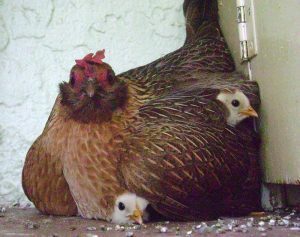
 CC by Jorge Elías 2.0
CC by Jorge Elías 2.0For the second Sunday in Lent, I bring you a children’s sermon on Luke 13:31-35. (You can find my regular Monday Meditation on this text here.)
The passage has two distinct sections. They do tie together as one scene, but they have different subjects, different literary styles, and very different emotional tones.
The first is passion predictions, in poetry, addressed to Herod, with unmistakable snarkiness. The second is a lament, in prose, addressed to Jerusalem, with unmistakable compassion.In a children’s sermon it’s always best focus on just one thing. I’m going to skip the snarky message to Herod about the passion. Don’t get me wrong: I’m not trying to avoid telling the kids about Jesus suffering and dying. But Luke actually gives plenty of passion predictions, so it comes up in other children’s sermons.
What is more rare here is the heart-rending love Jesus expresses in the second section. Sure, you see his compassion in action every time he heals someone. And you hear hints of it in a few passing comments elsewhere. Like at Lazarus’ tomb when John tells us simply “Jesus wept.” And in a story when someone said surely Jesus could heal if he was willing to heal, and Jesus said of course he was willing.
But in this little speech he articulates his compassion unprompted, and at greater length. I think that’s unusual, and important.
I’ll have to build a little conversational story around it, but that’s workable.
You are, of course, free to use this children’s sermon, or adapt it as you find most useful. But, if you use it, please do one (or more!) of the following.
You can let me know that you are using it, either in the comments below, or using the contact form above. You can put a little notice in your church bulletin that your children’s sermon is adapted from one published on GaryNealHansen.com.You can support my work over on Patreon. (Just $1 per month brings my children’s sermons straight to your inbox about two minutes after they go live. And every little bit keeps me going…)So here we go with a children’s sermon on Luke 13:31-35.
A Children’s Sermon on Luke 13:31-35Good morning kids! Welcome! I’m so glad you are here in worship this morning. Thanks for coming up to hear the children’s sermon.
Today is the second Sunday in Lent. In Lent we spend 40 days, plus six Sundays, getting ready for Easter. Jesus died on Good Friday, but on Easter Jesus rose up, alive again. On Easter, Jesus conquered death, and gave us all a whole new life—real life, forever life, with God.
Each week of Lent, our Sunday Gospel readings tell us different things to help us get ready for Easter.
Here’s how I imagine this week’s Gospel story happening.
Sad About the CityOne day, Jesus was sitting on a hill outside the city of Jerusalem. He was looking across toward the city.
His friend Mary was there, along with the other disciples.
“What’s up, Jesus?” she asked.
“I’m just looking at Jerusalem,” he said. “All those buildings, all full of people.”
“Yeah,” she said, “I see you’re looking at the city. But I’m wondering why you’re looking so sad?”
“It’s about Jerusalem, Mary,” Jesus said. “I know what Jerusalem is supposed to be—and I know what it’s actually been like.”
“What do you mean?” Mary said.
“Well,” he said, “Jerusalem is supposed to be God’s special city. King David, and all the kings afterward, had their palace here. And David’s son, Solomon, built God’s temple here. Jerusalem was supposed to be the city where all God’s people came to worship and to celebrate the holy days. It’s supposed to be where everybody learns to live God’s way. It’s supposed to be a city of peace.”
“That sounds great!” Mary said, “So why are you sad?”
“Because Jerusalem has never been peaceful for long,” he said. “The people have never really learned to live God’s way—or they can’t keep it up.”
“That is sad,” said Mary.
“You know what some people call Jerusalem?” Jesus asked. “They call it ‘the city that kills the prophets’!”
“Why do they say that?” Mary asked,
“Well, over the years it has happened a lot,” Jesus said. “God sends prophets to speak his message to the people, and what happens? The prophets get to Jerusalem, and people kill them. Or sometimes people throw rocks at them.”
On Being a Chicken“Wow!” said Mary. “That’s pretty rotten!”
“I know, right?” he said. “It just makes me so sad. I mean, I really love Jerusalem. I love the city, and I totally love the people who live there.”
“Yeah,” Mary said. “I wish there was something we could do!”
And she looked sadly at the city too.
“You know what I wish, Mary?” Jesus asked.
“What’s that, Jesus?”
“Sometimes—“ he started, but then he paused. “Now don’t laugh, but sometimes I really wish I was a chicken.”
Mary laughed. “What?!?” she asked “A chicken?!? Why?”
“I asked you not to laugh,” Jesus said. “You ever see a mama chicken with her little chicks? If there’s some problem, she’ll spread her wings and gather them up in a big old hug. That’s what I want to do with Jerusalem.”
“Aw…” said Mary, “that’s so nice.”
“I just love them so much!” Jesus said. “I don’t want anything bad to happen to them. And I want to help them learn to live God’s way.”
“That’s really great,” Mary said. “Think it’ll work?”
“I doubt it,” said Jesus.
“Why not?” she asked.
“No wings,” Jesus said. “I’m actually not a mama chicken.”
Going to Jerusalem“Right,” said Mary. “So what will you do?”
“I’m going to go to Jerusalem pretty soon,” he said. “I plan to tell them God’s message about the Kingdom of Heaven.”
“Wow,” Mary said. “That’s great. How do you think it’ll go?”
Jesus said, “I expect a lot of people will sing out ‘Blessed is he who comes in the name of the Lord!’”
“That sounds like they’re going to really welcome you,” Mary said.
Jesus looked sadly over at the city.
“Yep,” he said, “Jerusalem will welcome me the same way they welcomed the prophets.”
WonderingI wonder why the people were often so mean to the prophets?I wonder if you would like Jesus to hold you close and protect you, like a mama chicken hugs her chicks?I wonder if knowing Jesus loves you that way helps you get ready inside for Easter?++++++++++++It would totally make my day if I could send you all my new articles and announcements. Scroll down to the black box with the orange button to subscribe, and they’ll arrive by email most Fridays.
The post A Children’s Sermon on Luke 13:31-35 appeared first on Gary Neal Hansen.
March 4, 2022
A Children’s Sermon on Luke 4:1-13 — The Temptation of Christ

 CC by miss_ohara-NC 2.0
CC by miss_ohara-NC 2.0This Sunday is the first Sunday of Lent, so I bring you a children’s sermon on Luke 4:1-13, the temptation of Christ.
I love the story, and hope you’ll read my Monday Meditation on it here from a while back. It’s one of those texts where the details contradict every point I think I recollect about it. It’s richly complex text–but a children’s sermon needs to be simple.
I wonder if some background basics might be what kids really need here. Hmm… I’ll try to focus on the basic story, and the issues that drive it. Maybe that can keep my children’s sermon on Luke 4:1-13 on target.
You are, of course, free to use this children’s sermon, or adapt it as you find most useful. But, if you use it, please do one (or more!) of the following.
You can let me know that you are using it, either in the comments below, or using the contact form above. You can put a little notice in your church bulletin that your children’s sermon is adapted from one published on GaryNealHansen.com.You can support my work over on Patreon. (Just $1 per month brings my children’s sermons straight to your inbox about two minutes after they go live. And every little bit keeps me going…)A Children’s Sermon on Luke 4:1-13Good morning kids! Welcome. I’m so glad you are here today. Thanks for coming up to hear the children’s sermon.
Today we are in a whole new season of the church year. This is the first Sunday of Lent. For 40 days (plus six Sundays) we do things to get ready to celebrate the most important thing Jesus did to bring us back to God.
Lent is about getting ready for Easter Sunday when Jesus rose up from the grave to give us new life.
So how do we get ready to celebrate the amazing gift of Easter?
Around the world, the most traditional thing Christians do in Lent is called “fasting.” Fasting is when you give up eating certain foods for a while. For 40 days, we fast to remind ourselves to draw close to God in prayer, and try extra hard to live God’s way.
Today’s story from the Bible is about a time when Jesus himself fasted for 40 days.
Here’s what happened.
Baptized in the JordanWhen Jesus was growing up, he knew he had important work to do. When he was about 30 years old, he knew it was time to start.
The first thing he did was to go out to the River Jordan. His cousin John baptized him, and the Holy Spirit came down from heaven to be with him. He actually saw the Spirit come down like a dove. It landed right on his shoulder.
Then afterward, Jesus started to walk home to Nazareth.
But the Spirit whispered in his ear, “No, Jesus. Don’t go home. Not yet.”
Jesus said, “Why not? I’m done getting baptized!”
“That’s true,” said the Holy Spirit. “But you’re not done getting ready for your Great Work.”
“My ‘Great Work?'” asked Jesus.
“You know,” said the Spirit. “You’ll be telling everyone about God’s Kingdom. Showing what it means belong in God’s Kingdom. Inviting everyone to come along and be part of God’s Kingdom. You need to get ready.”
“I see,” said Jesus to the Spirit, who still sat on his shoulder looking for all the world like a beautiful dove.
“What do you think I need to do to get ready?”
Out to the Desert“Three things,” said the Spirit into Jesus’ ear. “First, follow me!”
And with that, the dove took off and flew away from the river, and away from the road. It flew a little way toward the desert, and then it landed on a bush.
So Jesus followed. But when Jesus got close to where the dove had landed, it cried out again, “Follow me!” and took off, flying a bit farther away. And then farther away. Then farther away again.
When Jesus was finally just where the Spirit wanted him, the dove hopped back onto Jesus’ shoulder. Jesus looked around.
“Wow!” he said. “You led me way out into the desert.”
“That’s right,” said the Spirit. “Coming to the desert alone is the first way to get ready for your Great Work.”
“But what am I supposed to do out here?” Jesus asked.
“I suggest you pray,” said the Spirit. “The more time you spend alone with God, the more ready you’ll be.”
Fasting“But shouldn’t I be getting back to town?” asked Jesus. “It’s dinner time and I missed lunch. My tummy is rumbling.”
“No,” said the Spirit. “You need to stay.”
“How long?” asked Jesus.
“Forty days,” said the Spirit.
“But that’s over a month!” said Jesus. “And I didn’t bring any food!”
“That’s good,” said the Spirit. “You’re not supposed to have food.”
“That sounds kind of crazy,” said Jesus.
“It’s called fasting,” said the Spirit. “Fasting means giving up certain kinds of food for a certain amount of time.”
“But I don’t have any food at all!” said Jesus,
“You’re special,” said the Spirit. “You’re going to fast from all food.”
“What’s so great about being hungry?” Jesus asked.
Temptation.
Being hungry will remind you to pray,” said the Spirit.
Being hungry will show you that you need to depend on God.
Being hungry will show you that you are in charge of your body–and your body is not in charge of you.”
‘Hmm…” said Jesus. “So praying and fasting will help me get ready. But you said there were three things. What else?”
“Right,” said the Spirit. “The devil is going to join you here in the desert. He’s going to bring you a whole bunch of temptations.”
“Temptations?” asked Jesus. “What do you mean?”
“Oh, this and that,” said the Spirit. “Things that seem really really good, but are actually bad. Things that you’d really want to do, but that you sort of know are really dangerous. It’s actually going to be really hard.”
“That sounds terrible!” said Jesus, “Why do I have to have temptations?”
“Well,” said the Spirit, “think of it as training, If you were training for a sport you would do hard things. You would do exercises, and lift weights, and run miles and miles to get strong. Facing temptations will make you strong.”
And that’s where the Spirit left Jesus, for 40 long days.
WonderingI wonder if you’ve ever gone somewhere alone to spend time praying? I wonder if your family has ever participated in a fast during Lent? I wonder if you’ve ever gotten stronger by facing hard things?++++++++++++It would totally make my day if I could send you all my new articles and announcements. Scroll down to the black box with the orange button to subscribe, and they’ll arrive by email most Fridays.
The post A Children’s Sermon on Luke 4:1-13 — The Temptation of Christ appeared first on Gary Neal Hansen.
March 1, 2022
A Children’s Sermon for Ash Wednesday

 “The Kids On Ash Wednesday” by Joe Shlabotnik is licensed under CC BY-NC-SA 2.0
“The Kids On Ash Wednesday” by Joe Shlabotnik is licensed under CC BY-NC-SA 2.0Today, by special request of a faithful reader, I offer you a children’s sermon for Ash Wednesday. (You can see a more historical and exegetical post on Ash Wednesday here.)
If you are a regular here, you know I publish a children’s sermon each week based on the Gospel reading assigned in the Revised Common Lectionary for the coming Sunday.
I haven’t (yet!) been doing them for non-Sunday services. But when I get a special request, how can I say no?
For Ash Wednesday I decided to talk instead about the significance of the day and the season of Lent.
I think the Gospel assigned by the Lectionary is problematic as an Ash Wednesday text. It’s a perfectly wonderful bit of Christ’s teaching, but not for Ash Wednesday. On Ash Wednesday that passage sets us up as hypocrites: the Gospel reading tells us to wash our faces and practice our penitence in secret, but then we go up to receive a visible mark of penitence—and most will wear that mark out onto the world.
That’s a spiritual and theological puzzle grown ups have a hard time with. Maybe it’s possible to extricate ourselves from it, I don’t really think I can make it clear to the simple and literal-minded eyes of children. I can just picture certain kids looking at me through narrowed eyes with the look that shows me they just don’t buy it.
++++++++++++You are, of course, free to use this children’s sermon, or adapt it as you find most useful. But, if you use it, please do one (or more!) of the following.
You can let me know that you are using it, either in the comments below, or using the contact form above. You can put a little notice in your church bulletin that your children’s sermon is adapted from one published on GaryNealHansen.com.You can support my work over on Patreon. (Just $1 per month brings my children’s sermons straight to your inbox about two minutes after they go live. And every little bit keeps me going…)So here you have my children’s sermon for Ash Wednesday, on the day and the season at hand.
A Children’s Sermon for Ash WednesdayHello kids! Thank you for coming up for the Children’s Sermon. I’m so glad you are here in worship.
Today is a very important day in the life of the church. It’s called “Ash Wednesday” and it is the first day of Lent. Ash Wednesday isn’t a happy joyful celebration, like Christmas or Easter. It is more of a serious day.
You may have noticed that the church is a little darker than usual.Maybe you noticed that the music is less cheerful than usual.Or maybe you noticed that people are speaking more softly than usual.Those things all help us get ready for something important and serious: Ash Wednesday and Lent,
LentLent is the 40 days (plus 6 Sundays) that we spend getting ready for the most important, the very best, the most joyful thing you can imagine. We are getting ready for Easter, when Jesus rose from the grave, alive again forever.
At Easter Jesus gives us the gift of new life, forever life, with the God who made us and loves us.
Easter is so important that we need to spend 40 days getting ready.
We get ready by turning our hearts to God, drawing close to God, and listening for ways we can live as God wants us to live.
Ash WednesdaySo Ash Wednesday is the start of Lent. Maybe you wonder why we call it “Ash” Wednesday. You’ll see, a little later in the service.
One by one, we’ll come up to the front of the church.
And, one by one, someone will take some dusty ashes and mark a cross on our foreheads.
The person marking us with dusty ashes will say some words from the Bible:
Remember that ‘you are dust,
and to dust you shall return‘.
Genesis 3:19 RSV
Then we’ll each go back to our seats.
Some people will leave the ashes on.Some people will wipe the ashes off.But those words from the Bible remind us all of something very important. It’s something about who we are.
You Are DustThose words come from near the very beginning of the Bible.
The Bible tells the story of when God first created human beings.
God had already made heaven and earth.
And God had filled the earth with land and oceans, plants and trees, fish and birds, animals and insects.
God wanted to make one more kind of creature.
That last creature would be like the animals, walking around on the land.But that last creature would also be like God, able to create, and love, and learn, and bless.That last very special creature was humanity. That’s you and me!
Now the way the Bible tells the story, when God created humanity, God scooped up a handful of the dust of the earth and molded it into a person.
In Hebrew, the ancient language of the Bible, the word for the dust of the earth is “Adam.” So the first name of humanity was “Adam”—in English that’s like the name “Dusty.”
Then God breathed into the person made of dust—God’s own breath, God’s own Spirit.
God’s life came into good old Dusty, and Dusty lived—and humanity could always know from its name that they came from dust.
To Dust You Shall ReturnGod warned humanity that, if they didn’t live as God intended, death would come into the world. Everyone who lived would one day die and return to dust.
And sadly, quite soon, just two chapters of the Bible later, that’s what happened.
Human beings started to make bad choices. We stopped living the way God intended us to live—creating, and loving, and learning, and blessing.
So, when humanity chose death instead of life, God gave them a reminder. God said those words,
Remembering
You are dust,
and to dust you shall return.
Genesis 3:19
On Ash Wednesday, the dusty ashes on our foreheads, and the words of the Bible, remind us of all those important things.
God made us from the dust of the earth.God breathed life into us to make us like GodAnd, eventually, someday, we all die and our bodies return to the dust of the earth.Lent is a time to remember, and to return to the life God first breathed into us—the life of creating, and loving, and learning, and blessing.
WonderingI wonder what you’ll think about when the ashes are put on your forehand?I wonder if you’ve ever felt like you were made from the dust of the earth?I wonder whether creating, or loving, or learning, or blessing feel most familiar to you?++++++++++++It would totally make my day if I could send you all my new articles and announcements. Scroll down to the black box with the orange button to subscribe, and they’ll arrive by email most Fridays.
The post A Children’s Sermon for Ash Wednesday appeared first on Gary Neal Hansen.
February 22, 2022
A Children’s Sermon on Luke 9:28-36–The Transfiguration
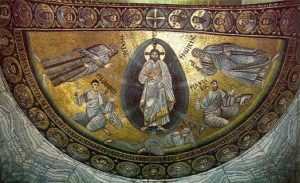
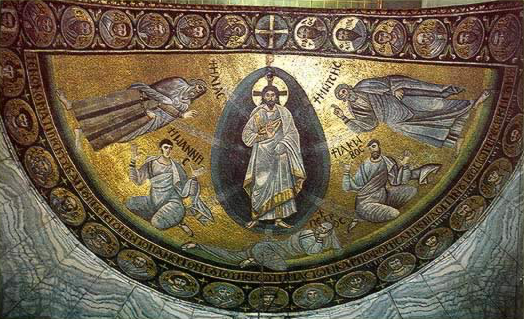 Mosaic of the Transfiguration, St. Catherine’s Monastery (public domain)
Mosaic of the Transfiguration, St. Catherine’s Monastery (public domain)It’s Transfiguration Sunday this week, so here’s my children’s sermon on Luke 9:28-36. (You can find my regular Monday Meditation on this passage here.)
The lectionary makes the next section of the chapter an optional extended version of the reading. I’m opting not to include it. Since it’s Transfiguration Sunday, the first part is crucial. The other section is really a different story altogether. (Though I love the way it shows how very human Jesus is–he’s so cranky, after his emphatically divine transfiguration.)
The challenge here is emphasizing to kids the central issue that the translations hide even from grown ups.
That is, the NRSV says Jesus, Moses, and Elijah were talking about Jesus upcoming “departure” in Jerusalem. That’s cryptic to the point of meaninglessness.
The Greek word translated “departure” is actually “exodus.” That should sound familiar: it’s the second book of the Bible, named specifically for the scene when Israel came out of slavery in Egypt through the parted waters of the Red Sea.
And, lo and behold, this helps explain why Elijah is there: he too miraculously parted the waters of the River Jordan and passed through. This was in his prophetic work of returning Israel to faithful life in the Covenant, you might say.
Now Jesus, the Messiah, will also have an exodus. No literal parting of waters—but the curtain in the Temple will be torn in two from top to bottom. And the people will be led out of slavery of another kind.
That’s pretty highfalutin’ stuff. We’ll see if it makes it into my children’s sermon on Luke 9:28-36.
++++++++++++You are, of course, free to use this children’s sermon, or adapt it as you find most useful. But, if you use it, please do one (or more!) of the following.
You can let me know that you are using it, either in the comments below, or using the contact form above. You can put a little notice in your church bulletin that your children’s sermon is adapted from one published on GaryNealHansen.com.You can support my work over on Patreon. (Just $1 per month brings my children’s sermons straight to your inbox about two minutes after they go live. And every little bit keeps me going…)A Children’s Sermon on Luke 9:28-36Good morning kids! I’m so glad you’re here today. Thanks for coming up to hear the children’s sermon.
Today is a very special Sunday in the church. This is the very last Sunday in the season of Epiphany.
For weeks and weeks we’ve heard stories about how Jesus started his work in the world.
He got baptized by John the Baptist in the Jordan. He did a miracle, turning water into wine. He told his hometown that he was the Messiah. He taught people and he healed people.Well, in today’s story we see how Jesus showed his very best friends who he really was and what he really came to do.
This day is called “Transfiguration Sunday” because of what his friends saw. Here’s what happened.
Going for a HikeOne day, Jesus and his friends were camping at the bottom of a mountain.
Jesus said, “Hey Peter, James, John—come with me!”
“Where are we going?” Peter asked.
“We’re going for a hike together,” Jesus said. “Just the four of us. Up this mountain.”
“Oh man,” said Peter. “Do we have to? I was looking forward to just relaxing today.”
“Look, Peter,” Jesus said, “I want to go up there and have some good prayer time. It’ll be like a little retreat. And I want you three with me because you’re my closest friends. Okay?”
“Alright.” Peter said.
So they headed up the trail.
Time to PrayAfter a while, when they were pretty high up on the mountain, Jesus said, “This looks like a good place. You guys wait over there while I pray, okay?”
James said, “Boy, I’m tired after hiking all the way up here. I think I’m going to take a nap while you pray.”
But Jesus said, “I’d rather you all stayed awake. Hey, I know: How about you pray too!”
“Okay,” James said. “But I don’t know much about praying.”
“Oh,” said Jesus. “Well, I’ll teach you more about praying another time. For today, just watch me.”
So, they all tried to stay awake and watch Jesus.
Surprise VisitorsWhile they watched, some very surprising things started to happen.
First, Jesus seemed to shine with light. Then his clothes became blindingly bright. He was like a night light in a dark room! He was like the sun on a summer day!
Peter, James, and John shielded their eyes from the glare, but they kept watching.
Suddenly they saw that Jesus wasn’t alone. Two other men were standing there, talking with him.
“Who are those guys?” asked Peter.
“I don’t know!” said John. “Let’s listen and see if we can figure it out.”
They missed the start of the conversation, but one of the strangers said, “It will be kind of like the first Exodus—when I led the people of Israel out of slavery in Egypt.”
“Right!” said the other one. “You parted the waters of the Red Sea. Just like later, when I parted the waters of the River Jordan!”
“Hey you guys,” said Jesus. “You know it wasn’t really you parting the waters!”
“Okay, fine,” said the first guy. “God did the miracle. But I had to be there and raise my staff, and things the that.”
“Yeah,” said the second guy. “God parted the waters, but I had to smack the river with my cloak.”
“Hey!” said John. “That must be Moses and Elijah!”
“That’s right!” said James. “Moses led the Exodus of Israel through the Red Sea. And Elijah parted the River Jordan!”
“Shh!” said Peter. “I want to hear what they’re saying.”
“Okay,” said James. “But don’t be so bossy.”
A New Exodus“The point,” Moses told Jesus, “is that you’re leading an exodus too–a NEW Exodus. what you do in Jerusalem will lead the people out of their slavery to sin.”
“Right,” said Elijah. “You’ll lead them through the waters to freedom.”
“Waters?” said Jesus. “Am I supposed to part the Sea of Galilee or something?”
“No,” said Moses. “They’ll all go through the waters of baptism.”
A Not-So-Good IdeaJust about then Peter stood up and said, “Wow Jesus! this is so cool! You know what we should do? We should build three little houses, you know? One for each of you. Then you could live up here, and the people could come up and talk to you about their problems! If they get sick, you could heal them. Or if they don’t understand the law they could ask Moses! I mean, he wrote it, right? And if they’re worried about the future thy could ask Elijah, because, you know, he’s a prophet!”
John started tugging Peter’s sleeve. “Peter! Sit down!” he said.
And honestly Peter didn’t know what he was talking about.
But then a thick dark cloud rolled in on the mountain. Everything got so foggy that Peter, James, and John couldn’t see a thing.
And from the middle of the cloud came a voice:
What you should really do is listen to Jesus!
He’s my son!
Jesus is my chosen one!
But then the cloud cleared—and Moses and Elijah were gone. It was just Jesus. And Jesus looked normal again.
They went back down the mountain. But they didn’t tell anybody what they’d seen. Not for a long time.
WonderingI wonder what it felt like to see Jesus shining with God’s glory?I wonder why Peter, James. and John didn’t tell anyone about what they saw?I wonder if they took God’s advice afterwards and listened to Jesus?++++++++++++It would totally make my day if I could send you all my new articles and announcements. Scroll down to the black box with the orange button to subscribe, and they’ll arrive by email most Fridays.
The post A Children’s Sermon on Luke 9:28-36–The Transfiguration appeared first on Gary Neal Hansen.



